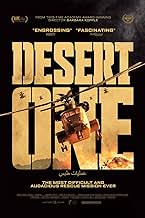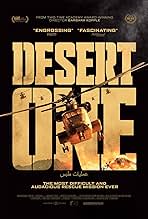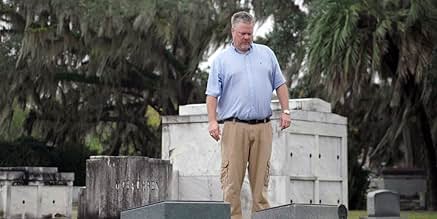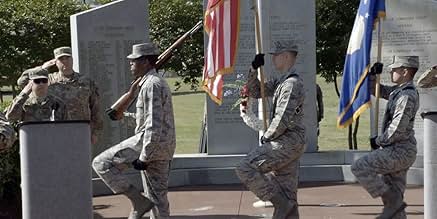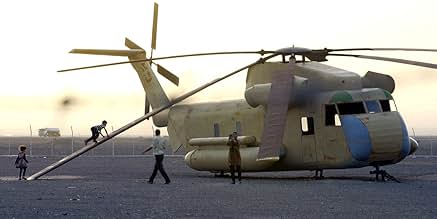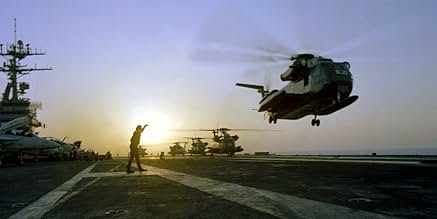Using new archival sources and unprecedented access, master documentarian Barbara Kopple reveals the story behind one of the most daring rescues in modern US history: a secret mission to fre... Read allUsing new archival sources and unprecedented access, master documentarian Barbara Kopple reveals the story behind one of the most daring rescues in modern US history: a secret mission to free hostages of the 1979 Iranian revolution.Using new archival sources and unprecedented access, master documentarian Barbara Kopple reveals the story behind one of the most daring rescues in modern US history: a secret mission to free hostages of the 1979 Iranian revolution.
- Awards
- 1 nomination total
James Q. Roberts
- Self - U.S. Army
- (as Maj James O. Roberts)
John Pustay
- Self - Deputy to Chairman, Joint Chiefs of Staff
- (as LTG John Putsay)
Kenneth Bancroft
- Self - U.S. Air Force
- (as TSgt Kenneth Bancroft)
Lewis Burruss
- Self - Delta Force
- (as Maj Lewis "Bucky" Burruss)
William G. Boykin
- Self - Delta Force
- (as Maj William G. Boykin)
Bucky Buchanan
- Self - U.S. Marine Corps
- (as SSgt Bucky Buchanan)
John Sigman
- Self - U.S. Marine Corps
- (as GySgt John Sigman)
Ed Seiffert
- Self - U.S. Marine Corps
- (as Col Ed Seiffert)
- Director
- Writer
- All cast & crew
- Production, box office & more at IMDbPro
Featured reviews
In 1977 President Jimmy Carter became the 39th President of the United States which was the first Democrat elected to the oval office since 1964. After Vietnam, Watergate and the political upheavals of four presidents in 15 years, unrest at home and a general malaise in the country, Carter promised a new start with transparency in the white house and a move away from the cynicism and disruption of national politics of the previous years. On foreign policy he had campaigned on a new approach to the cold war, a less antagonistic and confrontational approach towards the USSR which would include with arms control talks, a continuation of détente', an emphasis on human rights abroad as well as forging ahead with a middle east peace process.
Things started off well in 1977 with a Israel and Egypt finally agreeing to meet which laid the groundwork for the Camp David accords that formally ended their conflict in the autumn of 1978. However, that was the high point because on the other side of that region in Iran which was one of the US's closes allies was going through some political turmoil, with riots and demonstrations against the Shah's rule. This culminated in a revolution which saw the Shah being forced to leave the country in January 1979 and to be replaced by the exiled Ayatollah Khomeini returning to be proclaimed as supreme leader. This was an Islamic revolution of the highest order and was a serious challenge to the Carter administrations regional security interests.
However, things were only going to get worse because while in exile the Shah needed treatment for cancer and was admitted to hospitals firstly in Texas and then New York. This infuriated the Iranians who demanded that the Shah be returned to Iran to answer for his alleged crimes. When this was refused, Iranian militants/students stormed the US embassy in Tehran and took the 52 staff members hostage and refused to release them unless the Shah was returned to Iran. Even after the Shah died in August of 1980 the hostages remained, and it wasn't until January of the 1981 with the swearing in of a new American President that the embassy staff were finally allowed to leave Iran.
This documentary "Desert One" is an account of a bold and ambitious rescue attempt by the US in April of 1980. The backdrop of this was a Presidential election in November of 1980 and a very tense time between the USSR and USA with the invasion of Afghanistan in December of 1979 as well as the issue with the hostages in Iran. Rather than the cold war easing as Carter hoped, things became very tense. There was a feeling that Carter had been naive and duped by the Soviets and with the USA seemingly unable to do anything about the hostages, Carter's White House looked impotent.
The plan was to land aircraft and helicopters in Iran at a place code named Desert One. There all the special forces and CIA operatives would rendezvous. There was also a a CIA group were already in Tehran that would commandeer trucks, and they would all meet at Desert two about 60 miles from Tehran. The main assault group would then all drive to the embassy and free the hostages and then drive to a nearby stadium where the helicopters would be waiting and transport them to an abandoned airfield where they would be transported out of Iran to a safe country.
The beginning of the modern special forces was started by the British in WW2 during the desert campaign against the Afrika Corp in 1942. This was clandestine operations behind enemy lines destroying ammunition dumps and fuel supplies. Films such as "Sea of Sand" (1958) and "Play Dirty" (1970) were based to these types of excursions. The UK's special forces Special Air Service (SAS) then by the 1960's also moved into counter terrorism. Ironically only a month later in May of 1980 the Iranian embassy in London was taken over by anti-Khomeini militants and after 5 days the siege came to an end when the SAS successfully stormed the embassy and killed the terrorists and released the hostages. Another notable SAS raid was at Pebble Island in the Falklands war in 1982 where under the cover of darkness they destroyed 11 Argentine aircraft, ammunition and fuel storage areas at a base close to where the British were going to land. Prior to this in 1976 Israeli special forces successfully rescued American and Jewish passengers that had been taken hostage by Palestinian terrorists after they had hijacked their plane and landed it in Uganda.
In 1975 the USA the year before in had embarked on a rescue mission (which is known as the Mayaguez incident) on an island off Cambodia whose military forces had seized an American freighter and its crew. It's generally accepted that the military attack to rescue the crew was a shambles.
The mission was approved by President Carter and was led by the Delta force and supported by, air force, navy, army Rangers and CIA operatives. The mission was aborted when some of the helicopters used for the rescue malfunctioned probably due to damage caused by the severer sandstorms they had to fly through. Tragedy struck when a helicopter struck an aircraft on the ground and the resulting carnage left 11 Americans killed.
There is no doubt that the United States had the personnel, the equipment and the logistical ability to carry out such a rescue. The rescue of the Israeli hostages in Uganda and say the SAS attack on Pebble Island which probably both encountered unexpected obstacles nevertheless were successful because what they were both attempting was "a one and done hit" on enemy territory where both had the element of surprise. The trouble with eagle claw was that it had so many moving parts that everything would have had to gone right from the very beginning until the very end. Desert One, Desert Two, the embassy, the soccer field and the airfield where they planned to take off from was a total of "five hits" where if anything had gone massively wrong would have collapsed the rescue would have been an even more of a disaster.
The fact that the plan tripped up at the first fence was an indication of how complicated it was going to be. For a Hollywood movie the script was perfect, but in the real world the rescue was too convoluted to have any chance of success, at best it was a long shot and at worst it didn't really stand a chance. In a way being aborted at the outset although demoralizing, was probably the better outcome than if it had been compromised further down the line at the embassy or at the airfield.
Being unable to foresee how the sandstorms could cause so much difficulty for the aircraft and their equipment and overlooking the fact that the place they set up Desert One had a main road running through it was a massive oversight which indicated that too many who would have known better were excluded from discussing the mission. There was too much "group think" and not enough critical analysis from experienced people outside the military planners involved.
The plan should have been briefed by some military experts who had the job of going through the plan and picking it apart. The military people involved who believed in their plan and really wanted to have a go and officials in the administration who were easily persuaded into supporting eagle claw because it might get them out of a political straight jacket as diplomacy seemed to have stalled.
Things started off well in 1977 with a Israel and Egypt finally agreeing to meet which laid the groundwork for the Camp David accords that formally ended their conflict in the autumn of 1978. However, that was the high point because on the other side of that region in Iran which was one of the US's closes allies was going through some political turmoil, with riots and demonstrations against the Shah's rule. This culminated in a revolution which saw the Shah being forced to leave the country in January 1979 and to be replaced by the exiled Ayatollah Khomeini returning to be proclaimed as supreme leader. This was an Islamic revolution of the highest order and was a serious challenge to the Carter administrations regional security interests.
However, things were only going to get worse because while in exile the Shah needed treatment for cancer and was admitted to hospitals firstly in Texas and then New York. This infuriated the Iranians who demanded that the Shah be returned to Iran to answer for his alleged crimes. When this was refused, Iranian militants/students stormed the US embassy in Tehran and took the 52 staff members hostage and refused to release them unless the Shah was returned to Iran. Even after the Shah died in August of 1980 the hostages remained, and it wasn't until January of the 1981 with the swearing in of a new American President that the embassy staff were finally allowed to leave Iran.
This documentary "Desert One" is an account of a bold and ambitious rescue attempt by the US in April of 1980. The backdrop of this was a Presidential election in November of 1980 and a very tense time between the USSR and USA with the invasion of Afghanistan in December of 1979 as well as the issue with the hostages in Iran. Rather than the cold war easing as Carter hoped, things became very tense. There was a feeling that Carter had been naive and duped by the Soviets and with the USA seemingly unable to do anything about the hostages, Carter's White House looked impotent.
The plan was to land aircraft and helicopters in Iran at a place code named Desert One. There all the special forces and CIA operatives would rendezvous. There was also a a CIA group were already in Tehran that would commandeer trucks, and they would all meet at Desert two about 60 miles from Tehran. The main assault group would then all drive to the embassy and free the hostages and then drive to a nearby stadium where the helicopters would be waiting and transport them to an abandoned airfield where they would be transported out of Iran to a safe country.
The beginning of the modern special forces was started by the British in WW2 during the desert campaign against the Afrika Corp in 1942. This was clandestine operations behind enemy lines destroying ammunition dumps and fuel supplies. Films such as "Sea of Sand" (1958) and "Play Dirty" (1970) were based to these types of excursions. The UK's special forces Special Air Service (SAS) then by the 1960's also moved into counter terrorism. Ironically only a month later in May of 1980 the Iranian embassy in London was taken over by anti-Khomeini militants and after 5 days the siege came to an end when the SAS successfully stormed the embassy and killed the terrorists and released the hostages. Another notable SAS raid was at Pebble Island in the Falklands war in 1982 where under the cover of darkness they destroyed 11 Argentine aircraft, ammunition and fuel storage areas at a base close to where the British were going to land. Prior to this in 1976 Israeli special forces successfully rescued American and Jewish passengers that had been taken hostage by Palestinian terrorists after they had hijacked their plane and landed it in Uganda.
In 1975 the USA the year before in had embarked on a rescue mission (which is known as the Mayaguez incident) on an island off Cambodia whose military forces had seized an American freighter and its crew. It's generally accepted that the military attack to rescue the crew was a shambles.
The mission was approved by President Carter and was led by the Delta force and supported by, air force, navy, army Rangers and CIA operatives. The mission was aborted when some of the helicopters used for the rescue malfunctioned probably due to damage caused by the severer sandstorms they had to fly through. Tragedy struck when a helicopter struck an aircraft on the ground and the resulting carnage left 11 Americans killed.
There is no doubt that the United States had the personnel, the equipment and the logistical ability to carry out such a rescue. The rescue of the Israeli hostages in Uganda and say the SAS attack on Pebble Island which probably both encountered unexpected obstacles nevertheless were successful because what they were both attempting was "a one and done hit" on enemy territory where both had the element of surprise. The trouble with eagle claw was that it had so many moving parts that everything would have had to gone right from the very beginning until the very end. Desert One, Desert Two, the embassy, the soccer field and the airfield where they planned to take off from was a total of "five hits" where if anything had gone massively wrong would have collapsed the rescue would have been an even more of a disaster.
The fact that the plan tripped up at the first fence was an indication of how complicated it was going to be. For a Hollywood movie the script was perfect, but in the real world the rescue was too convoluted to have any chance of success, at best it was a long shot and at worst it didn't really stand a chance. In a way being aborted at the outset although demoralizing, was probably the better outcome than if it had been compromised further down the line at the embassy or at the airfield.
Being unable to foresee how the sandstorms could cause so much difficulty for the aircraft and their equipment and overlooking the fact that the place they set up Desert One had a main road running through it was a massive oversight which indicated that too many who would have known better were excluded from discussing the mission. There was too much "group think" and not enough critical analysis from experienced people outside the military planners involved.
The plan should have been briefed by some military experts who had the job of going through the plan and picking it apart. The military people involved who believed in their plan and really wanted to have a go and officials in the administration who were easily persuaded into supporting eagle claw because it might get them out of a political straight jacket as diplomacy seemed to have stalled.
Desert One provides a thoughtful revisit to one of the greatest intelligence failures in recent American history. How is it possible that this tragic mission was green-lighted at the highest levels of our government when according to the film, its realistic chances for success seemed so painfully and obviously lacking? As the documentary clearly points out, a key element in the rescue plan required a nighttime multi-helicopter journey over hundreds of miles of unknown (and likely dangerous) desert terrain and weather conditions. Apparently all of this was to be done with only limited advance preparation and thus a minimal awareness of the probable circumstances we could reasonably expect to encounter in the mission.
It is said that success has many parents but failure is always an orphan. Desert One presents an obvious example of just how true this statement is. As the documentary recalls one unforeseen and surprising event after another---the cumulative effects of which ultimately led to an aborting of the mission--we again are struck by its apparent lack of appropriate readiness and the absence of reliable intelligence that denied us the opportunity to get a more sober assessment of Operation Eagle Claw's chances for a positive outcome.
Desert One unfolds in a sober and riveting way as it tells us the story of this mission, the truly brave men who participated in it and where and how it went wrong. Of course unanswered questions remain. Who were the principal cabinet advisors who counseled President Carter to go ahead with Operation Eagle Claw given all its risks? Why were we so ill prepared to deal with the real conditions encountered on the ground? Could the mission have been aborted sooner based upon the facts experienced at the time?
We come away from seeing Desert One much better informed about this sad episode. That is the hallmark of a good documentary. We should be grateful to all who participated in its creation who enabled us to better understand the facts depicted in Desert One. And when another such dangerous mission does turn out well--like the later taking out of Osama Bin Laden-we should better appreciate the tremendous difficulties heroic Americans needed to overcome to achieve that success.
It is said that success has many parents but failure is always an orphan. Desert One presents an obvious example of just how true this statement is. As the documentary recalls one unforeseen and surprising event after another---the cumulative effects of which ultimately led to an aborting of the mission--we again are struck by its apparent lack of appropriate readiness and the absence of reliable intelligence that denied us the opportunity to get a more sober assessment of Operation Eagle Claw's chances for a positive outcome.
Desert One unfolds in a sober and riveting way as it tells us the story of this mission, the truly brave men who participated in it and where and how it went wrong. Of course unanswered questions remain. Who were the principal cabinet advisors who counseled President Carter to go ahead with Operation Eagle Claw given all its risks? Why were we so ill prepared to deal with the real conditions encountered on the ground? Could the mission have been aborted sooner based upon the facts experienced at the time?
We come away from seeing Desert One much better informed about this sad episode. That is the hallmark of a good documentary. We should be grateful to all who participated in its creation who enabled us to better understand the facts depicted in Desert One. And when another such dangerous mission does turn out well--like the later taking out of Osama Bin Laden-we should better appreciate the tremendous difficulties heroic Americans needed to overcome to achieve that success.
"Desert One" (2020 release; 107 min.) is a documentary that examines what exactly happened with the doomed 1980 secret mission to rescue the 52 US hostages being held in Tehran. As the movie opens, we are "April 24, 1980" as choppers are getting ready to depart from the USS Nimitz. We then go back in time and we get an "Iran 101" crash course on what has happening in the 1960s and 70s, as it all leads up to the Iranian revolution in 1979 and the subsequent storming of the US Embassy. At this point we are 10 min. into the documentary.
Couple of comments: this is the latest documentary from double Oscar-winning documentarian Barbara Kopple. My regard for her is such that I will watch any documentary she makes, no questions asked. Heck, if she were to make a documentary about the erstwhile Yellow Pages, I'd go see that! But here she examines what transpired exactly 40 year ago this summer, when President Carter send in a Special Ops Delta Force, and I mean the best of the best. As to the rescue mission, with 20/20 hindsight it was clear that chances for a good outcome were low. That is acknowledged by many who participated in the mission, speaking here on camera. It also is astonishing how ill equipped the helicopters were for this mission (2 of the 8--25%!! think about that--malfunctioned). As to the mission participants themselves, they are true heroes in every which way. Sadly 8 of them lost their lives. When the mission returns to base (outside of Iran), and British solders piece together what has been happening, they sent over some cases of beer with the note "To you all from us having the guts to try". Lastly, as to the documentary itself, it unearths tons of footage and audio tapes that I had never seen or heard before. Today's (fragile looking) Carter, Mondale and many other key people from that era, including of course several who were held hostage, and several who participated in the rescue mission, are all given plenty of screen time. I found this to be a very insightful documentary on many levels.
"Desert One" opened this past weekend at my local art-house theater here in Cincinnati, while requiring strict adherence to all COVID-19 rules. Not that it mattered, as the Tuesday early evening screening where I saw this at turned out to be a private screening. I was literally the only person in the theater. If you love a good documentary or have an interest in finding out more about the ill-fated Iran rescue mission, I'd readily suggest you check this out, be it in the theater, on VOD, or eventually on DVD/Blu-ray, and draw your own conclusion.
Couple of comments: this is the latest documentary from double Oscar-winning documentarian Barbara Kopple. My regard for her is such that I will watch any documentary she makes, no questions asked. Heck, if she were to make a documentary about the erstwhile Yellow Pages, I'd go see that! But here she examines what transpired exactly 40 year ago this summer, when President Carter send in a Special Ops Delta Force, and I mean the best of the best. As to the rescue mission, with 20/20 hindsight it was clear that chances for a good outcome were low. That is acknowledged by many who participated in the mission, speaking here on camera. It also is astonishing how ill equipped the helicopters were for this mission (2 of the 8--25%!! think about that--malfunctioned). As to the mission participants themselves, they are true heroes in every which way. Sadly 8 of them lost their lives. When the mission returns to base (outside of Iran), and British solders piece together what has been happening, they sent over some cases of beer with the note "To you all from us having the guts to try". Lastly, as to the documentary itself, it unearths tons of footage and audio tapes that I had never seen or heard before. Today's (fragile looking) Carter, Mondale and many other key people from that era, including of course several who were held hostage, and several who participated in the rescue mission, are all given plenty of screen time. I found this to be a very insightful documentary on many levels.
"Desert One" opened this past weekend at my local art-house theater here in Cincinnati, while requiring strict adherence to all COVID-19 rules. Not that it mattered, as the Tuesday early evening screening where I saw this at turned out to be a private screening. I was literally the only person in the theater. If you love a good documentary or have an interest in finding out more about the ill-fated Iran rescue mission, I'd readily suggest you check this out, be it in the theater, on VOD, or eventually on DVD/Blu-ray, and draw your own conclusion.
My dad was on this mission for the USAF, I'll let him summarize this review: "Lost some good friends. Too many players, egos, uncoordinated. Led to formation of Special Ops Command"
10virek213
One of the great tragedies in the history of U. S. military operations outside of an actual war itself was the attempt in April 1980 by the U. S. Special Forces unit known as the Delta Force to effect a rescue of the personnel being held at our besieged embassy in Teheran, Iran. The operation, known as Eagle Claw, owing to a lack of foresight at the highest levels, was both well-intentioned and, sadly, misconceived; and owing to two of the eight helicopters involved in that operation malfunctioning, plus a blinding sandstorm in the Iranian desert, resulted in the deaths of eight U. S. servicemen on April 24, 1980, and prolonged the Iranian hostage crisis until January 20, 1981.
DESERT ONE, a 2019 documentary directed by Barbara Kopple, the legendary documentary filmmaker responsible for, among many classic docs, 1976's HARLAN COUNTY U. S. A., and 2006's DIXIE CHICKS: SHUT UP AND SING, takes a look at the lead-up to this event, including America's turbulent relationship with Iran, one which went rocky in 1953 when Iran's then-leader, and democratically elected prime minister, Mohammed Mosadegh was overthrown and killed in a violent CIA-sponsored coup. This resulted in the ascension of Reza Pahlavi, the "Shah", to power in Iran, where he was for all intents and purposes a "toady" for the United States. But in 1979, the Shah was overthrown by the Ayatollah Khomeni; and on November 4th of that year, radical students inspired by Khomeni seized the American embassy, holding fifty-two American diplomats hostage. This prompted then-President Jimmy Carter to instigate Operation Eagle Claw. The intent was to hatch a raid seemingly similar to Israel's 1976 Entebbe rescue mission. Its failure, and the deaths of the eight servicemen, dealt a blow to American prestige and morale, prolonged the hostage crisis, doomed Carter's re-election chances in 1980, and led to Ronald Reagan's ascension to the presidency.
In DESERT ONE, we get interviews with both Carter and his vice-president Walter Mondale, as well as interviews with former CIA director Robert Gates; legendary ABC newsman Ted Koppel (whose "Nightline" followed the Tehran hostage crisis from start to finish, and would become a fixture on ABC's late night programming for decades to come); and many of the embassy hostages and surviving members of Operation Eagle Claw (Michael Metrinko; James Q. Roberts; Ed Seiffert), as well as recorded telephone conversations between President Carter and Charles Beckwith, the legendary special forces commander responsible for the creation of Delta Force, of what was happening with the mission as it was unfolding and, unfortunately, fatally unraveling. Much of what emerges from DESERT ONE is the realization that dealing with what we call Middle East radicalism (especially when, in the case of Iran, it's something that our own government foments) and, eventually, terrorism is not nearly as cut-and-dried as we may have wanted to think it was.
But what also emerges is the fact that a group of good men at least had the guts to try and rescue our personnel from the hellhole they found themselves put in by the takeover of the embassy; and they deserve all the credit, the praise, and the commendations from We The People that they can get.
DESERT ONE, a 2019 documentary directed by Barbara Kopple, the legendary documentary filmmaker responsible for, among many classic docs, 1976's HARLAN COUNTY U. S. A., and 2006's DIXIE CHICKS: SHUT UP AND SING, takes a look at the lead-up to this event, including America's turbulent relationship with Iran, one which went rocky in 1953 when Iran's then-leader, and democratically elected prime minister, Mohammed Mosadegh was overthrown and killed in a violent CIA-sponsored coup. This resulted in the ascension of Reza Pahlavi, the "Shah", to power in Iran, where he was for all intents and purposes a "toady" for the United States. But in 1979, the Shah was overthrown by the Ayatollah Khomeni; and on November 4th of that year, radical students inspired by Khomeni seized the American embassy, holding fifty-two American diplomats hostage. This prompted then-President Jimmy Carter to instigate Operation Eagle Claw. The intent was to hatch a raid seemingly similar to Israel's 1976 Entebbe rescue mission. Its failure, and the deaths of the eight servicemen, dealt a blow to American prestige and morale, prolonged the hostage crisis, doomed Carter's re-election chances in 1980, and led to Ronald Reagan's ascension to the presidency.
In DESERT ONE, we get interviews with both Carter and his vice-president Walter Mondale, as well as interviews with former CIA director Robert Gates; legendary ABC newsman Ted Koppel (whose "Nightline" followed the Tehran hostage crisis from start to finish, and would become a fixture on ABC's late night programming for decades to come); and many of the embassy hostages and surviving members of Operation Eagle Claw (Michael Metrinko; James Q. Roberts; Ed Seiffert), as well as recorded telephone conversations between President Carter and Charles Beckwith, the legendary special forces commander responsible for the creation of Delta Force, of what was happening with the mission as it was unfolding and, unfortunately, fatally unraveling. Much of what emerges from DESERT ONE is the realization that dealing with what we call Middle East radicalism (especially when, in the case of Iran, it's something that our own government foments) and, eventually, terrorism is not nearly as cut-and-dried as we may have wanted to think it was.
But what also emerges is the fact that a group of good men at least had the guts to try and rescue our personnel from the hellhole they found themselves put in by the takeover of the embassy; and they deserve all the credit, the praise, and the commendations from We The People that they can get.
Did you know
- GoofsThe occupants of the C130 are looking out of the left-hand paratroop door at the fire; someone closes the door but it slides left to right. The paratroop door opens vertically, so it should slide down to close.
- Quotes
Jimmy Carter: Do you have any report on the helicopter's location?
- ConnectionsReferences ABC News Nightline (1979)
Details
- Release date
- Country of origin
- Official site
- Languages
- Also known as
- Desert One - Gidseldramaet i Teheran
- Filming locations
- Production companies
- See more company credits at IMDbPro
Box office
- Budget
- $1,500,000 (estimated)
- Runtime1 hour 48 minutes
- Color
Contribute to this page
Suggest an edit or add missing content





